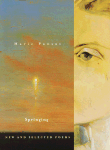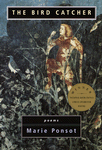|
|
 |
|
|
 |
 |
 |
 |
OLD JOKES APPRECIATE
from SPRINGING
Up the long stairs I
run
stumbling, expectant.
Impatience is hopelessly
desperate.
Hope
takes time.
Sort out the private from the
personal.
Advance on losses at a decent pace.
"Aside from
all that, Mrs. Lincoln,
how did you like the
play?"
DRUNK & DISORDERLY, BIG
HAIR
from SPRINGING
Handmaid to Cybele,
she is a Dactyl, a
tangle-haired
leap-taking
hot Corybantica.
Torch-light &
cymbal-strikes
scamper along with her.
Kniving & shouting,
she
heads up her dancing girls
streaming sorority,
glamorous
over the forested slopes of Mt. Ida
until she hits
60 and
loses it (since she's supposed
to be losing it, loses
it).
Someone takes over
her sickle & signature tune.
Soon
they leave her & she doesn't care.
Down to the valley
floor
scared she won't make it, she
slipslides unlit to no
rhythm,
not screaming. But now she can
hear in the
distance
some new thing, surprising.
She likes it. She wants
it.
What is it? Its echoes originate
sober as heartbeats, her
beat,
unexpected. It woos her.
The rhythm's
complex
—like the longing to improvise
or, like Aubade
inside Lullaby
inside a falling and rising
of planets. A
clouding. A clearing.
She listens. It happens
between her own
two ears.
ORIGIN
from SPRINGING
The skull or shell
or wall of bone shaped
with its egg advantages
does not advertise
the gardens it contains,
the marriages, the
furies,
or the city it shelters
(clangs, clouds,
silences,
found souls crowding,
big dank cans where
things
putrify)
or the glade it hides
for us to hide in,
where
—our lives eased open—
we drowse by the pond and
wake
beside ourselves with thirst,
where (dipping the cup we
find)
we get of necessity
a drink of some depth
full of
taste
and original
energy.
The darling face,
the fragrant chevelure,
even the beautiful ears
on the shell do not
boast about the workplace
inside.
They prefer to appear to agree
they
are just along for the ride.
WHAT WOULD YOU LIKE TO BE
WHEN YOU GROW UP?
from SPRINGING
1
Here I am in the garden
on my knees
digging
as if I were innocent,
gloveless in island
soil—
sandy, unstable,
hardly soil at all,
very sharp and
mineral.
Planted to temper the heat,
this garden has trees
& fruit trees.
After a stormy spring
it's a low-walled well of
green
bouncing into blossoming.
Already it turns me
toward
autumn crocus now in leaf,
chrysanthemum, feverfew,
white &
gold after the pears drop.
It's at its best in winter,
free of
me, as I imagine it-
its six wonderful places to sit
(next to the
tarragon and sage,
under the dogwood for breakfast,
on a log
beside the speedwell).
It has taught me
planning which is
essential
is impossible.
Mistakes (bittersweet,
honeysuckle)
come back every year
hugely bountiful. So do
the
peonies, lilies, & daylilies,
& grandma's rampant
rose.
Dear garden of my making
stuffed with my ideas &
sweat,
you are reasonable.
Your pleasure
is, like me,
physical.
So, behave.
I can't keep counting on my
fingers
to make sure all your parts are on hand.
I head for
the kitchen, to cook.
I have no other plans.
You were not what
I needed after all.
2
The reason for the garden is
this
rooming house, this tidy
body's heart, my minded body
where I
now rent only
the attic regularly,
and the kitchen, on odd
nights.
It is the shabby residence
or sidereal repeat
of
recurrent astonishment.
And it has known in every room
the
othering bliss of child,
my child, each child different
for each
other's sake, each
blessing me blind,
tenant & ceaseless &
tiresomely
teaching me
relentlessly
to reach joy by
choosing
to love. I so choose, I think.
Only the rich can
choose to be poor.
There must be something I can do.
I think
I've got whatever I need
in the overhead compartment.
Excerpted from Springing by
Marie Ponsot
Copyright 2002 by Marie Ponsot. Excerpted by
permission of Knopf,
a division of Random House LLC. All rights reserved. No part of this excerpt
may be reproduced or reprinted without permission in writing from the publisher.
Pourriture Noble
a moral tale, for Sauternes, the fungus
cenaria, and the wild old
from
THE BIRD CATCHER
Never prophesy.
You can't. So don't try.
Lust, pride, and lethargy
may cause us misery
or bliss.
The meanest mistake
has a point to make.
Hear this--
what his vintner d'Eyquem said
once the lord of d'Eyquem was dead:
"The wine that year promised bad or none.
He'd let it go too late.
Rot had crawled through all the vines,
greasy scum on every cluster
dangling at the crotches of the leaves.
Should have been long picked
but he'd said, 'No. Wait for me,'
off to wait on a new woman,
grapes on the verge of ripe
when he left. Coupling kept him
till rot wrapped the grapes like lace
& by the time she'd kicked him out
the sun had got them, they hung
shriveled in the blast.
Well, he rode home cocky
& bullied the grapes into the vats
rot & all, spoiled grapes, too old,
too soon squeezed dry.
The wine makes.
The wine makes thick, gold-colored,
& pours like honey.
We try it. Fantastic!
not like honey, punchy,
you've never drunk anything like it--
refreshing, in a rush
over a heat that slows your throat--
wanting to keep that flavor
stuck to the edge of your tongue
where your taste is, keep it
like the best bouquet you can remember
of sundown summer & someone coming
to you smiling. The taste has odor
like a new country, so fine
at first you can't take it in
it's so strange. It's beautiful
& believe me you love to go slow."
moral:
Age is not
all dry rot.
It's never too late.
Sweet is your real estate.
OLD MAMA SATURDAY
("Saturday's Child Must Work for a Living.")
from
THE BIRD CATCHER
"I'm moving from Grief Street.
Taxes are high here
though the
mortgage's cheap.
The house is well built.
With stuff to
protect, that
mattered to me,
the security.
These things
that I mind,
you know, aren't mine.
I mind minding them.
They weigh on my mind.
I don't mind them well.
I haven't got
the knack
of kindly minding.
I say Take them back
but you
never do.
When I throw them out
it may frighten you
and
maybe me too.
Maybe
it will empty me
too
emptily
and keep me here
asleep, at sea
under the guilt
quilt,
under the you tree."
Separate, in the Swim
(Temara Plage, Morocco)
from
THE BIRD CATCHER
Oiled and drowsy, idling in a sling
of turquoise cotton, you take the sun.
I stow my rings, cash, shirt, & frayed
cords of connection under your chair.
I cross bands of hot sand then damp cool,
to the waves rustling up
broken by the aim of wave, the idea
that picks up the water
and throws it at the shore.
Invading the invading sea, leaning to it
arms at an angle, I wade in slowly,
weight forward, leading with my knees,
soft-jumping in answer to wave-swell.
Wet to the hips I dive under
and swim turning in to pleasure.
The sea surges inshore. I surge out.
The seas alter me and alter after me,
allowing me a horizontal stride.
Armstrokes & legstrokes echo in my cells
heating the circuit of blood.
Each stroke starts a far drumming
clumping the kelp, helping
shells and rubbish decay into sand.
I press out a pulse (it will
throb back as another pulse) along
the sea-floor and the furthest beaches.
In this stretch of the Atlantic
the whole Atlantic operates.
As I ride, its broad cast evokes
my tiny unity, a pod, a person.
Thanks to the closure of skin
I'm forking the tune I'm part of
though my part is played moving
on a different instrument.
I hear the converse of wave-work
fluid in counterpoint, the current
unrupturing. I push: the Atlantic
resists so that I can push myself
toward a music which on this scale
is balance, balancing buoyancies,
able to condense me back out with it
having carried my will
forward a while before
it carries me to shore.
You have slept.
You have taken the sun.
I towel myself dry.
���
Excerpted from The Bird Catcher by Marie Ponsot. Copyrightę 1998 by Marie Ponsot. Excerpted by permission of Alfred A. Knopf, Inc., a division of
Random House LLC. All rights reserved. No part of this poem may be reproduced or reprinted without permission in writing from the publisher.
|
|
 |
|
|
 |
|
|
|


